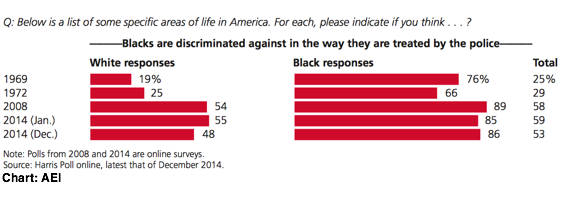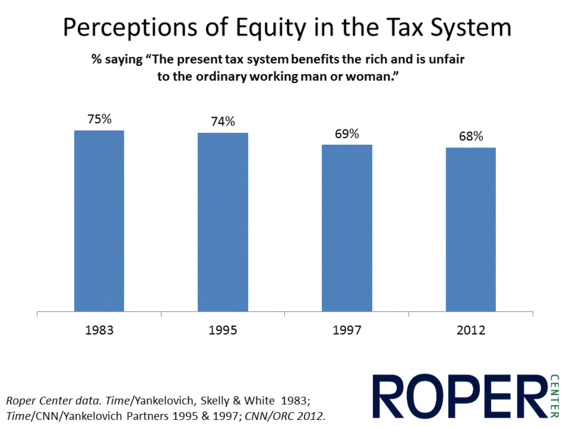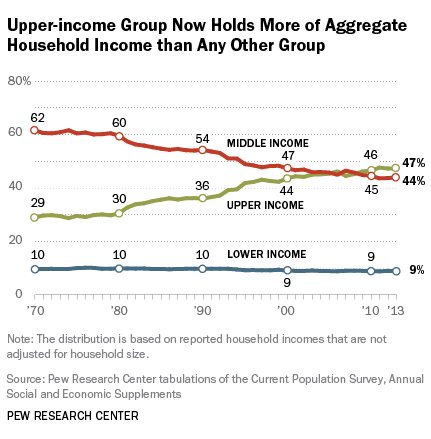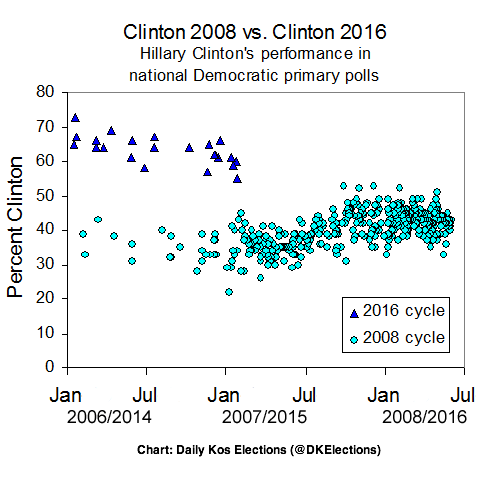
Voters in three key battlegrounds support tax hikes on the rich. The share of adults living in middle income households has narrowed. And Hillary Clinton's support is greater now than in 2007. This is HuffPollster for Thursday, February 5, 2015.
BATTLEGROUNDS WANT CHANGE IN DIRECTION, FAVOR TAX HIKE FOR WEALTHY - Quinnipiac University: "President Barack Obama has negative approval ratings in the key swing states of Florida, Ohio and Pennsylvania, but voters in each state strongly support his call to raise taxes on the rich to help the middle class, according to a Quinnipiac University Swing State Poll released today. Voters in each state want the next president to 'change direction from Barack Obama's policies,' the independent Quinnipiac University Poll finds." Large majorities say they support rather than oppose "increasing taxes on higher income earners to reduce the amount of taxes paid by the middle class" in Florida (58 to 36 percent), Ohio (61 to 35 percent) and Pennsylvania (62 to 33 percent). [Quinnipiac]
PERCEPTIONS ON WEALTH AND THE TAX SYSTEM HAVE CHANGED OVER TIME - Kathleen Weldon: "Wealth is the eye of the beholder, and Americans give a wide range of figures when asked how much income would make someone rich. Perceptions have changed, however, since early data on the subject. Considering inflation-adjusted figures, Americans in 1996 and 2011 were much more likely to consider those making under approximately $150,000 a year to be rich than were respondents in 1948...Most Americans see the tax system serving the interests of the wealthy. Majorities since the 1980s have agreed that "the present tax system benefits the rich and is unfair to the ordinary working man or woman…It is not then surprising that, when asked whether they support tax increases on the wealthy, the majority have consistently been in favor...Moreover, most Americans do not appear to accept the argument that increased taxes on the wealthy would come at a cost to the economy...Questions which put raising taxes on the wealthy in the context of federal budget deficit reduction draw particularly strong support for increases." [HuffPost]
AMERICAN MIDDLE INCOME TIER HAS YET TO RECOVER FROM DECADES OF LOSS - Rakesh Kochhar & Richard Fry: "In the years following the Great Recession, the share of Americans who live in middle-income households held steady at 51% in 2013, the same share as in 2010...While the muddled recovery has yet to bolster the middle, this flat trend might actually be good news because, for now, it stems a decades-long slide...The share of adults who live in middle-income households has eroded over time, from 61% in 1970 to 51% in 2013...The narrowing in the middle happened for all major racial and ethnic groups....Incomes of all households are higher today than they were in 1970. Upper-income households saw the most growth, as their median income increased 43% from 1970 to 2013. However, the overall gains mask a lengthy period – a lost decade, and then some – of losses from 2000 to 2013. During this time, the median incomes of lower-, middle- and upper-income households have fallen by 9%, 6% and 6%, respectively. Currently, the incomes of these households are comparable to what they were in 1997...Upper-income households command a higher share of the U.S. aggregate household income than ever before....Today’s distribution of aggregate income stands in stark contrast to what it looked like four decades ago...These data points are further confirmation of the nation’s growing economic inequality...Americans are seeing it too. In a January 2014 Pew Research Center survey, 65% of adults said the gap between the rich and everyone else had increased in the past 10 years." [Pew Research]
AMERICAN CONFIDENCE IN POLICE SPLIT BY RACE - Karlyn Bowman: "Americans express a relatively high level of confidence in police, and this has changed little over time. In 2014, only the military and small business ranked above police in terms of high confidence in Gallup’s data. There are significant differences by race, with blacks in data Gallup aggregated for 2006-2014 having roughly half as much confidence as whites. Americans have significantly less confidence in the criminal justice system than in the police…The percent of Americans who agree with the statement that blacks are discriminated against in the way they are treated by police has increased since the Harris Poll first asked the question in 1969... [T]he proportion who agree with the statement has more than doubled since then, from 25 to 53 percent nationally...Although levels of support differ, there are areas of agreement among blacks and whites about police practices and reforms." [AEI]

HILLARY CLINTON: NOW VS. 2007 - Daily Kos Elections plots Clinton's performance on national trial heat polls now versus comparable polls during the 2008 cycle and finds a consistent difference. [@DKElections]
MOST AMERICANS SUPPORT SICK LEAVE AND PARENTAL LEAVE - HuffPollster: "A majority of Americans think employers should be required to pay for sick leave and time off for new parents, according to a HuffPost/YouGov poll. Seventy percent say companies should be compelled to offer paid sick leave to employees, while 67 percent favor paid maternity leave, and 55 percent support paid paternity leave, the poll found. The divide in opinion on sick leave and maternity leave has remained relatively unchanged since HuffPost last asked about the issue in June 2013. Paternity leave, however, has gained some currency, with support now 8 percentage points higher than it was in the earlier poll." [HuffPost]
HUFFPOLLSTER VIA EMAIL! - You can receive this daily update every weekday morning via email! Just click here, enter your email address, and click "sign up." That's all there is to it (and you can unsubscribe anytime).
THURSDAY'S 'OUTLIERS' - Links to the best of news at the intersection of polling, politics and political data:
-Andrew Gelman adds a suggestion to HuffPollster's take on the 'margin of error' controversy. [WashPost]
-Gallup releases party identification estimates from 2014 for all 50 states. [Gallup]
-A measles epidemic worries 53 percent of the American public. [YouGov]
-Sixty percent of Americans favor ending the U.S. economic embargo of Cuba, while 35 percent want it to continue. [AP, topline]
-Andrew Kohut reviews how Americans have come to accept a more diverse nation since passage of the Immigration and Nationality Act of 1965. [Pew]
-Ron Brownstein breaks down the changing demographics of Florida, North Carolina and Virginia, three key states for winning the White House in 2016. [National Journal]
-New Jersey residents feel Hillary Clinton would make a better president than Chris Christie.
[Monmouth]
-Nate Cohn sees pandering to conservative populists in Jeb Bush's future. [NYT]
-Steve Koczela dives into the latest polling in Boston on the city's Olympic bid. [MassInc]
-Two scholars find that less competitive U.S. House races have produced less voter engagement and a decline in local news. [Brookings]
-Mark Mellman (D) offers thoughts on the politics of vaccination. [The Hill]
-Advanced analytics spreads through government, but the demand for data scientists outstrips supply. [Motherboard via @SimonJackman]
-The Census Bureau discontinues three-year estimates from the American Community Survey due to budget constraints. [Census]



